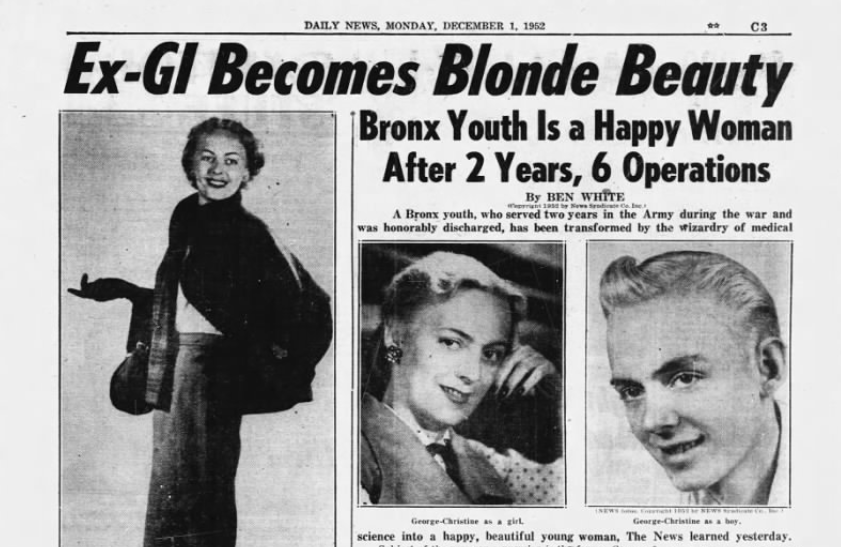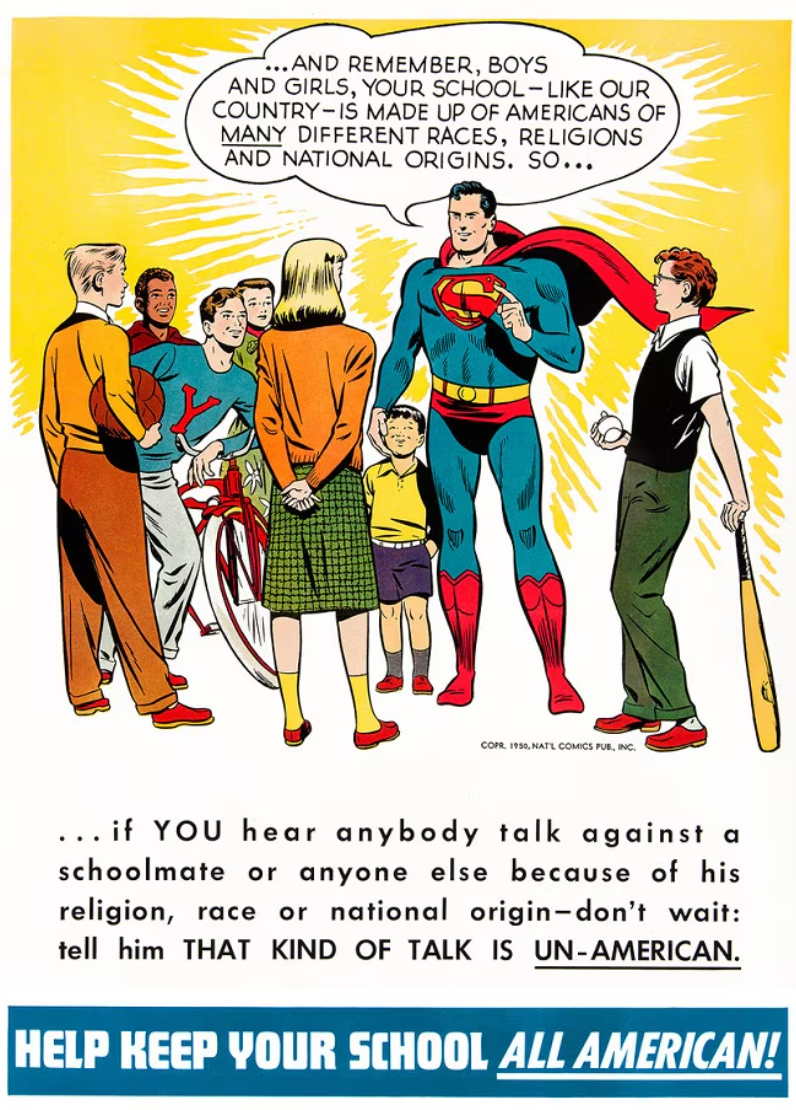The Progressive Betrayal of Trans Americans
Transgender Americans like me are trapped in a grim paradox. Our progressive champions may have introduced notions of “birthing persons” to corporate America, but they have done little to safeguard our fundamental right to bodily autonomy. As legislative threats from Republicans escalate, those same progressive champions stand to benefit, undeservedly, from a style of civil rights advocacy that unwittingly takes hostage a minority group that feels increasingly desperate for protection.
A Long History of Changing Bodies
In 1952, African Americans faced Jim Crow, doctors labeled same-sex attraction a mental disorder, and homosexuality was criminalized in nearly every state. Yet in that same year, a New York Daily News headline proudly heralded, “Ex-GI Becomes Blonde Beauty: Bronx Youth is a Happy Woman After 2 Years, 6 Operations.”

The blonde beauty was Christine Jorgensen, and much of the media coverage of her was surprisingly positive. A Chicago Daily Tribune article from the same year, “Parents Praise Bravery,” included quotes from Jorgensen’s father, who declared his daughter deserving of “an award higher than the Congressional Medal of Honor” for volunteering to undergo “guinea pig treatment.”
Jorgensen also faced intense scrutiny, but the criticism often lacked a coherent narrative. One article chided her apparent inability to distinguish between mink fur and nutria fur, while Time implied she might have transitioned for fame rather than a genuine femininity.
Seven decades later, a great deal of progress has been made. A 2022 Pew Research poll found that only 10 percent of Americans oppose protecting transgender people from discrimination—protections that have been enshrined in law by the highest court of the land. Operations like Jorgensen’s are no longer at the forefront of medical technology. With the rise of extreme body modification, they’re not even the most radical kind of personal presentation Americans might encounter.

In my hometown of Austin, Texas, Eric “Lizardman” Sprague proudly displays bright green skin, subdermal implants, and a forked tongue. The Guinness World Records publishes articles on people like Eric, and many Americans enjoy popular reality TV shows like “Botched,” which depict extreme cosmetic transformations.
![Amazing Transitions on Botched: Rodrigo Alves [E! Entertainment] YouTube](https://d2eehagpk5cl65.cloudfront.net/img/q60/uploads/2025/02/taf3-1-271x300.png)
One might think that in an era of unprecedented tolerance and body modification, transgender people would be the least of anyone’s concerns. But turn on the TV and you will find little discussion of the Lizardman or worries of a rhinoplasty craze sweeping our youth. Instead, the 2024 legislative session saw more than 500 anti-LGBT bills introduced nationwide, with a significant portion targeting transgender individuals.
Now, only a month into Donald Trump’s second presidency, a series of executive orders has made it clear the issue is one of Trump’s top priorities. How did we get here?
The Cost of Mandated Inclusivity
The society Christine transitioned in was one still reeling from the horrors of World War II. While Nazi officers stood trial at Nuremburg, the Allied powers faced a trial of their own: If the deeply held values of the old world had led to this, what use were those values?
The cool-headed rationalism promised by the League of Nations had failed. Nationalism marched with Germany into Poland and imperialism sailed with Japan into Nanjing. Even science could be regarded with suspicion. Once the providence of Western optimism and world fairs, it had bathed the empire of the rising sun in atomic hellfire and left hundreds of thousands of civilians dead in its wake.
What values could justify such destruction of the old world and the creation of the new? Americans found a powerful answer to that question in civil rights.
The same year Christine Jorgensen transitioned, a Superman poster illustrated this emerging idea of American duty: “To talk against someone because of his religion, race, or national origin is

UN-AMERICAN.” What makes Superman a hero and not a tyrant—what justifies his exertion of force—is this commitment. If such a poster were made today, the cartoonist would probably add sex, sexuality, and gender identity to that list of protected groups.
That’s a compelling message, made all the more compelling when Superman is thwarting the creation of a death ray.
But when legislators take on the responsibility of regulating discrimination out of existence, real life has a tendency to present challenges rarely covered in the pages of Action Comics.
What constitutes discrimination? How should laws against discrimination be enforced? What is an appropriate punishment for having discriminated against someone?
Is that un-American if someone uses “he” or “him” to describe me? What if someone calls me a “tranny”? What if someone calls me a tranny and I’m OK with it? Faced with questions like these, it’s not surprising that an often flawed government might fail to regulate effectively. As an adult, I feel I should have the right to negotiate my own boundaries for what’s appropriate. The government disagrees.
As civil rights laws have evolved, the government has created a set of regulatory standards for what is and is not discrimination. Because it is impossible for Congress to anticipate every potential scenario in which discrimination may take place, questions like the ones posed above are decided by the courts.
Discrimination lawsuits can present a significant cost to businesses. Fee-shifting provisions, like those found in Title VII of the Civil Rights Act of 1964, the Americans with Disabilities Act, and the Fair Housing Act, allow courts to award attorneys’ fees to the “prevailing party,” often the plaintiff, if that person succeeds in proving discrimination. These practices make losing a discrimination case particularly costly.
Businesses have responded by taking every step possible to guard against accusations of discrimination. This rational response, however, has created an unintended arms race.
Guidelines established by the Equal Employment Opportunity Commission in conjunction with the Uniform Guidelines on Employee Selection Procedures (codified in the 1991 Civil Rights Act) have created a legal framework in which failure to adopt “best practices” heightens the risk of liability.
If businesses begin to adopt an expansive set of diversity, equity, and inclusion (DEI) programs, that decision can become one piece of a broader best practice and, therefore, instrumental in protecting against liability. United States Steel boasts of its commitment to “fostering diverse, inclusive and equitable workplaces.” This kind of language is universal among large U.S. firms—not because employees of tech companies in San Francisco and steel mills in Gary, Indiana, share social preferences, but because both companies exist downstream from the same federal standards.

This arrangement has put the bureaucrats who design DEI programs in charge of regulating social norms at work, at school, and in government.
If a transgender man works at United States Steel, my guess is that he’s capable of handling a few jabs on the job. In fact, my guess is that he’s one hard-nosed son of a bitch, like the other hard-nosed sons of bitches he works with, and that it might not help him integrate at work if everyone is walking on eggshells around him.
Then again, maybe he likes the DEI programs offered at his workplace. Many employees appreciate strong protections and identity affinity groups. There’s a genuine business argument to be made that such programs can be used as a tool to recruit and retain talent from minority groups.
But in such cases, putting regulatory force behind them is all the more absurd. Rather than allow employees to self-select into employers that match their preferences, our laws encourage the adoption of a single, universal, hyper-progressive option.
There’s no doubt this option works for many transgender—and non-transgender—people in San Francisco and New York. But for those of us who live in red states, introducing neologisms and radically restructuring what is appropriate speech have only inflamed cultural tensions.
Progressive activists’ ability to push their most unpopular opinions into every area of American life that is regulated by civil rights law has failed to deliver us the kinds of protections that matter, while also making the political right—and generally apolitical voters who might be drawn to the right—more hostile toward us.
Putting Freedom Back at the Center
What matters most to me and millions of other transgender people is much more fundamental than linguistic minutiae. It’s freedom.
I should have the freedom to wear the clothes I want to wear and I should have the freedom to pursue cosmetic changes to my body. But that freedom goes both ways. You should be free to not care, not date me, not call me a woman, and not pay for my hormones or surgeries.
Cases like the “Lizardman” suggest that Americans are broadly open to even radical free expression. But many of the central transgender issues of today—public restrooms, sports participation, metaphysical questions about womanhood—require society to do more than just leave transgender people alone.
They are about what transgender people are entitled to. Does our society have an obligation to protect transgender people from being misgendered in the workplace? Does it have an obligation to provide transgender women access to their preferred restrooms and sports teams?
Among these issues, Americans remain divided. Despite finding only 10 percent who oppose protecting transgender people from discrimination, the same Pew data show Americans divided on the questions posed above: 41 percent believe transgender people should use bathrooms that match their biological sex, and 58 percent believe trans athletes should compete on teams that match their biological sex. Only 27 percent of Americans (and a minority of Democrats) believe health insurance companies should be required to cover gender transitions.
Moreover, while Americans are broadly in favor of bodily autonomy for adults, most agree that we have a social responsibility to protect children from decisions they may come to regret. And on the question of whether that means preventing minors from transitioning, Americans are also divided: 46 percent believe such transitions should be illegal.
These disagreements speak to fundamental philosophical values that can’t be ignored. Americans ought to have a great deal of freedom to negotiate the answers to these questions for themselves. The current interpretation of civil rights law makes that impossible, instead putting activists in charge of regulating social norms.
The Trump administration made a major stride forward by repealing Executive Order 11246, which required the government to engage in affirmative action. But other executive orders leave much to be desired, indicating Republicans have more interest in instituting their own regulations than in freedom.
Thus far, the Trump administration has focused on withholding government funding. Executive Order 14187, “Protecting Children from Chemical and Surgical Mutilation,” restricts federal funding to medical institutions providing gender-affirming care to individuals under 19, including treatments like puberty blockers and hormone therapies. Meanwhile, Executive Order 14201 bans transgender women and girls from participating in female sports teams at educational institutions, threatening to withhold federal funding from schools that do not comply.
I would normally argue that no sports team, educational institution, or medical provider is entitled to government money. But just as civil rights law makes a more laissez-faire approach to speech in the workplace prohibitively costly, the extent of government involvement in sports, education, and medicine makes genuine competition between private organizations with differing views unlikely.
We must defend freedom on two fronts. First, the arms race for progressive workplace regulation has to end, and that begins with scaling back fee-shifting and the informal and formal regulations on best practices. Second, our government must be held to its constitutional commitment not to infringe on personal liberties.
If a company wants to mandate respectful pronoun use and gender-neutral bathrooms, then it should have that freedom. If a sports league wants to let transgender athletes compete with athletes of the opposite sex, then it should have that freedom. And if a hard-nosed son of a bitch working at a steel mill in Indiana is OK with being jokingly called a “tranny,” then goddammit—he should have that freedom.
The post The Progressive Betrayal of Trans Americans appeared first on Reason.com.
Source: https://reason.com/2025/02/21/the-progressive-betrayal-of-trans-americans/
Anyone can join.
Anyone can contribute.
Anyone can become informed about their world.
"United We Stand" Click Here To Create Your Personal Citizen Journalist Account Today, Be Sure To Invite Your Friends.
Before It’s News® is a community of individuals who report on what’s going on around them, from all around the world. Anyone can join. Anyone can contribute. Anyone can become informed about their world. "United We Stand" Click Here To Create Your Personal Citizen Journalist Account Today, Be Sure To Invite Your Friends.
LION'S MANE PRODUCT
Try Our Lion’s Mane WHOLE MIND Nootropic Blend 60 Capsules
Mushrooms are having a moment. One fabulous fungus in particular, lion’s mane, may help improve memory, depression and anxiety symptoms. They are also an excellent source of nutrients that show promise as a therapy for dementia, and other neurodegenerative diseases. If you’re living with anxiety or depression, you may be curious about all the therapy options out there — including the natural ones.Our Lion’s Mane WHOLE MIND Nootropic Blend has been formulated to utilize the potency of Lion’s mane but also include the benefits of four other Highly Beneficial Mushrooms. Synergistically, they work together to Build your health through improving cognitive function and immunity regardless of your age. Our Nootropic not only improves your Cognitive Function and Activates your Immune System, but it benefits growth of Essential Gut Flora, further enhancing your Vitality.
Our Formula includes: Lion’s Mane Mushrooms which Increase Brain Power through nerve growth, lessen anxiety, reduce depression, and improve concentration. Its an excellent adaptogen, promotes sleep and improves immunity. Shiitake Mushrooms which Fight cancer cells and infectious disease, boost the immune system, promotes brain function, and serves as a source of B vitamins. Maitake Mushrooms which regulate blood sugar levels of diabetics, reduce hypertension and boosts the immune system. Reishi Mushrooms which Fight inflammation, liver disease, fatigue, tumor growth and cancer. They Improve skin disorders and soothes digestive problems, stomach ulcers and leaky gut syndrome. Chaga Mushrooms which have anti-aging effects, boost immune function, improve stamina and athletic performance, even act as a natural aphrodisiac, fighting diabetes and improving liver function. Try Our Lion’s Mane WHOLE MIND Nootropic Blend 60 Capsules Today. Be 100% Satisfied or Receive a Full Money Back Guarantee. Order Yours Today by Following This Link.






